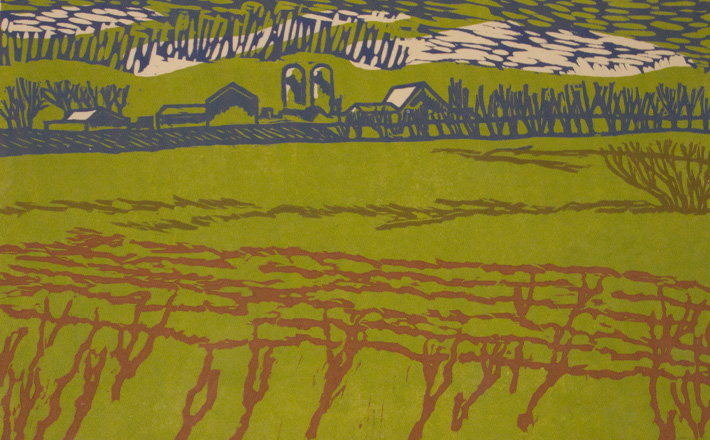Commentary on Ecclesiastes 1:2, 12-14, 2:18-23
What has been is what will be,
and what has been done is what will be done;
there is nothing new under the sun. (Ecclesiastes 2:9)
Don’t you just feel that way sometimes? Maybe even a lot of the time? There is nothing new in this world; it’s always the same old thing, day after day after day. The same demands are placed on you day in and day out, at work, at home. The same conversations, the same arguments even, with co-workers, spouses, children. And children, at this point in the summer, endlessly repeat the same hot, sticky complaints of boredom. Nothing ever really gets finished; nothing is ever settled; nothing will ever be just right. And for what? Just, it sometimes seems, so that we can get up the next day and do it all again? What a waste of breath.
We wait for those markers in the year that will break the monotony and bring us the happiness we long for in these days of drudgery: vacations, holidays, special gatherings with family and friends. Yet even those days come and go, and the happiness they bring us is gone like a breath — or maybe they fail to bring us the joy we expected at all.
It’s precisely this sense of the drudgery and even meaninglessness of life that the writer of the passage for today so aptly describes. Qoheleth, the Hebrew name of the book of Ecclesiastes and the name we give to the writer, means teacher, particularly one who teaches in the assembly. Qoheleth is learned in wisdom, having dedicated himself to studying it (1:13), and he speaks with authority to the assembled. What he has found in that wisdom, however, is the folly of human reasoning.
To understand “all that is done under heaven” (1:13) is so far beyond human ability that it is foolishness to believe we can even make a dent in the vastness of what we don’t know. “Of making many books there is no end” (12:12), for an infinity of books could never contain all knowledge. The search for wisdom will never be finished; it is “a chasing after wind” (1:14).
Moreover, Qoheleth has observed that what often passes for wisdom in his day is worse than folly; it’s simply untrue. Like Job’s interlocutors, popular wisdom in Qoheleth’s time had it that the good prospered and the evil suffered. But Qoheleth’s study of life has revealed to him the folly of such supposed wisdom. The good and the evil ultimately face the same end; the same darkness of death awaits all, regardless of a person’s virtue or lack of it. “How can the wise die just like fools?” he asks incredulously (2:16).
Even more unacceptable is his observation that at times “there are righteous people who are treated according to the conduct of the wicked, and there are wicked people who are treated according to the conduct of the righteous” (8:14). The good and the evil do not get what we think they deserve; sometimes just the opposite is the truth. This, to Qoheleth, is vanity, a fleeting nothing, meaninglessness.
Work is vanity, for Qoheleth. Labor and toil are endless, producing nothing but pain and anxious sleeplessness (1:1-4; 2:22-23). Success is also vanity, for it brings nothing near the satisfaction it promises (2:1-11). Justice is vanity: human justice is unjust, corrupt, and God’s justice is unknowable (3:16-22). The oppression of the powerless, “with no one to comfort them” (4:1-3), is vanity. Better off than both the living and the dead is “the one who has not yet been, and has not seen the evil deeds that are done under the sun” (4:3).
So for Qoheleth, all the things in which we place our effort and value, all the things on which we focus our attention, are vanity. They are either gone in a breath with nothing to show for them, or they are downright evil. There is a meaninglessness that prevails over all human activity. So what does Qoheleth prescribe? To “eat, drink, and be merry,” as the text is popularly summarized? Do we gather what enjoyment we can from life, because there’s no more meaning to it than that momentary pleasure?
Such a prescription itself seems like a waste of life. Simply to seek one’s pleasure and expect nothing more is to give in to the despair, to accept meaninglessness and hopelessness as given, and to preclude even the possibility of something more substantial. It also portrays a profound lack of faith in the God who delights in our very being, and in whom we are to find our delight.
Such an interpretation is far from the word that Qoheleth has for us. The cure for despair and hopelessness, and the desire of God for human beings, is to find joy precisely in this wearying life. Several times (2:24-25; 3:12-13; 5:18) Qoheleth asserts that, when confronted with the apparent meaninglessness of life, the best we can do is enjoy ourselves — take joy in eating, drinking, even in our work. A particular joy is to be found in companionship with one another; two are better than one, he writes, “For if they fall, one will lift up the other” (4:9-10). We are to see such enjoyment in play, in work, and in relationships as gifts from God; indeed, enjoyment comes “from the hand of God” (2:24).
In the midst of a life that seems rife with monotony and dissatisfaction and sorrow, out of the corners of our eyes we can see small glimmers of God’s grace. Days like Christmas and Easter, those moments when God’s dazzling light breaks through all darkness, only come once a year. The rest of the time we can often catch only a glitter here and there, as we struggle through the demands, the tedium, the felt meaninglessness of life. Despair casts a veil over our eyes, blinding us to the brilliance of God’s love. But if we see momentary joys as what they are, as small pinpricks of light in the veil, we live not in despair over meaninglessness but in hope for the day when that light shines brilliantly on all.
So let’s enjoy these remaining days of summer before they slip away. Let’s look forward to the next glimmer of grace, where we may expect to see it and where it may take us by surprise. And when that moment is over, let’s look forward to the next.


August 4, 2013